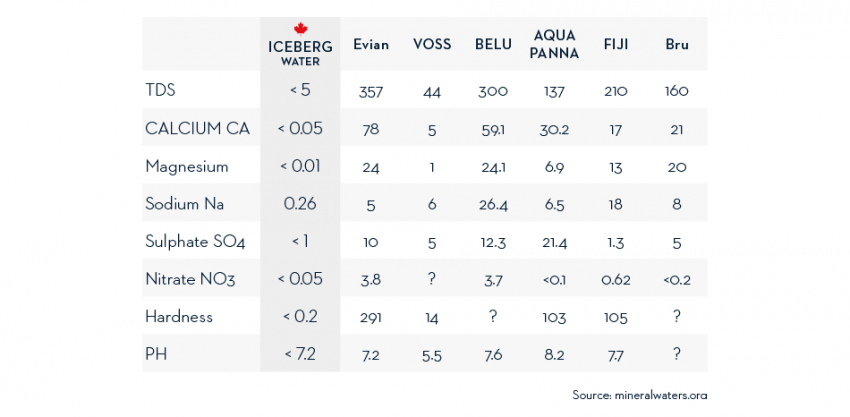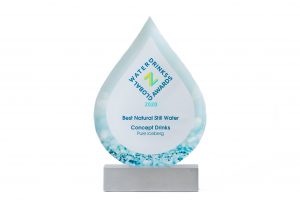ICEBERG’s purity
The glacier from which the Canadian icebergs originate consists of the unpolluted precipitation that fell and froze in the Arctic Circle thousands of years ago. Therefore ICEBERG Water has the lowest mineral content of any bottled water, resulting in a smooth and neutral taste. ICEBERG Water has a low mineral content of only 5 TDS (Total Dissolved Solids) measured in parts per million. Its mineral content determines the taste of water and TDS is the most important factor when combining food with water. ICEBERG Water is ideal for pairing with rare and fine liquids such as single malts to ensure the ultimate flavour experience.
“ICEBERG Water has the lowest mineral content of any bottled water.”
All ICEBERG Water is routinely checked in our laboratory and independent laboratories carry out further bacteriological analyses to ensure its purity. With each batch of ICEBERG Water comes a booklet with certificates and an official statement that provides the icebergs background and harvesting information.

For the second time voted in 2020 as best naturel still water by the Zenith Global Water Drinks Awards.

All ICEBERG Water is bottled at source, in its natural environment of Lewisporte, Newfoundland. This guarantees that the freshness of the water is maintained, and also helps support the local economy by offering employment opportunities to the local population.
Minerals
CALCIUM & MAGNESIUM
Calcium and magnesium levels combine to determine the ‘hardness’ of the water. A high level of calcium and magnesium makes it ‘hard’ water, which feels distinctly heavy and can have an aftertaste. ICEBERG Water contains a very small amount of calcium and magnesium and therefore feels soft and smooth. The neutral taste makes it perfect water for pairing with wines and single malts.
SODIUM
Sodium compounds naturally enter water. The most familiar sodium compounds are sodium chloride (NaCl), otherwise known as kitchen salt. The adult intake of sodium (salt) comes from food and easily reaches the average required amount. The small amount of sodium in ICEBERG Water does not affect the (after)taste.
SULPHATE
Sulphate (SO4) can be found in almost all natural waters. Sulphate is one of the major dissolved components of rain. High concentrations of sulphate in drinking water can have a laxative effect when combined with calcium and magnesium, the two most common constituents of hardness.
NITRATE
The virginity indicates how protected a water is from its surroundings. The level of nitrate, an inorganic compound consisting of one nitrogen atom and three oxygen atoms, determines it. Nitrate is easily transported through soil by water and is not removed by standard water softeners or filters. An extremely high level of nitrate contamination may cause serious health risks. ICEBERG Water is made of snow accumulated into glacial walls shielded from the outside world for at least 12.000 years and therefore contains no nitrate and sulphate.
CHLORIDE
Chloride is a salt compound that is the result of the combination of the gas chlorine and a metal. In combination with a metal such as sodium it becomes essential for life, as small amounts of chlorides are required for normal cell functions.
